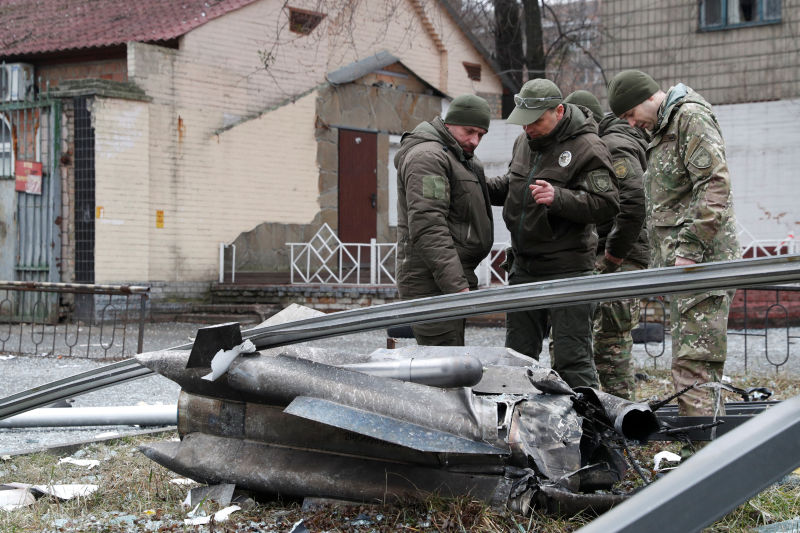Global stocks and US bond yields dived on Thursday, while the dollar, gold and oil prices rocketed higher – past $100 a barrel – after Russian president Vladimir Putin began an invasion of Ukraine after a blistering warning.
Ukrainian president Volodymyr Zelensky said Russian missiles were targeting the country’s military installations, including airfields.
He has called on the country’s parliament to approve a martial law declaration, the Kyiv-based Ukrayinskya Pravda reported.
Several explosions were heard in the Ukrainian capital Kyiv before dawn, after an initial series of sounds similar to artillery fire, a witness reported, shortly after Russia announced the military operation.
“The Russian armed forces are launching attacks on peaceful Ukrainian cities from different directions, including from the territory of the temporary occupied Donbas and Crimea, as well as from the southeast region [of Ukraine],” the Ukrainian foreign ministry said in a statement early on Thursday.
Putin called on Ukrainian soldiers to immediately lay down their weapons and go home, and said the responsibility for any bloodshed will be on the conscience “of the Ukrainian regime”, according to comments carried by Russian news agencies.
The comments worsened an already grim selloff in Asian trade, pushing MSCI’s broadest index of Asia-Pacific shares outside Japan down more than 3%, with Australian shares off more than 3% and Chinese blue chips down 1.3%.
Tokyo’s Nikkei was 2.4% lower. India’s benchmark Sensex was also 2.5% down. US stock market futures were also down sharply, with S&P 500 e-minis down 2% and Nasdaq futures 2.5% weaker.
Oil prices touched a seven-year high of $100 a barrel.
“The escalation of the Russia-Ukraine situation poses risks to energy market stability and raises the prospect of potentially more severe sanctions on Russia,” Moody’s rating agency said on Thursday.
Markets Price In Invasion
“The markets figure Russia will now do whatever it wants given how weak the sanctions were, and are pricing in an invasion,” Ray Attrill, head of FX strategy at National Australia Bank, said.
“The real worry is that Europe is cut off from Russian gas. The EU couldn’t cope with such a supply shock and would have to rein in demand, which would be economically debilitating,” he added.
“Higher energy prices are also where the rubber hits the road as far as global economic growth is concerned, that’s got to be bad for risk sentiment.”
Asset markets have seen a sharp increase in volatility over the deepening crisis, with oil racing past $100 per barrel and the Cboe Volatility Index, known as Wall Street’s fear gauge, up more than 55% over the past nine days.
Brent crude futures, which seesawed between sharp rises and falls on Wednesday, resumed a climb past $100 a barrel on Thursday, adding nearly 5% to $101.60 by 4.40 GMT. West Texas Intermediate rose about the same (4.93%) to $96.64 per barrel.
Spot gold jumped more than 1.2% to $1,930.86, its highest since early January 2021.
Putin’s comments torpedoed US stocks, with the Dow Jones Industrial Average down 1.38% to barely above the level that would have confirmed a correction.
The MSCI World Index, a leading gauge of equity markets globally, skidded to its lowest level since April 2021.
Imminent US Policy Tightening
Investors have also been grappling with the prospect of imminent policy tightening by the US Federal Reserve aimed at combating surging inflation, which NAB analysts say could be exacerbated by a commodities supply shock.
While expectations of an aggressive 50-basis-point increase at the Fed’s March meeting have eased, Fed funds futures continue to point to at least six rate rises this year.
Immediate geopolitical threats weighed on US yields on Thursday, pushing the benchmark US 10-year yield down sharply to 1.9165% from its US close of 1.977% on Wednesday. The 2-year yield also fell, to 1.5358% from a close of 1.6%.
The global flight to safety boosted the dollar, which jumped 0.267 against a basket of other major trading partners to 96.444. The euro was down 0.38% on the day at $1.1266.
The Moscow stock exchange announced on Thursday that all trading had been suspended after the rouble fell 3.5% against the dollar after the invasion began. The Russian currency fell more than 3% on Wednesday.
Russia’s early-hours stock index fell more than 11% on early trading.
The global sell-off spread to cryptocurrency markets, pushing bitcoin below $36,000 and to a one-month low of $35,197.44.
“Markets are now more adequately pricing in the risk of something horrific happening,” Rob Carnell, head of Asia Pacific research at ING, said.
“That combined with the uncertainty is a horrible environment to be in. No one wants risk exposure when that’s floating around.”
- Reuters with additional editing by Sean O’Meara
This report was updated with new details on February 24, 2022.
ALSO READ:
Asia Stocks Suffer Amid Ukraine Invasion, Tech Crackdowns
Russian Stocks Fall More Than 8% Over Ukraine Tension
Ukraine Crisis May Hit Asian Nations Relying on Russian Oil, Gas
























